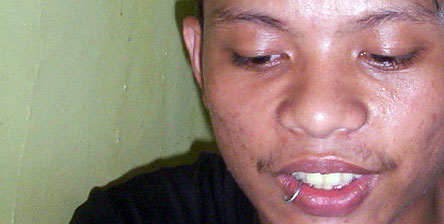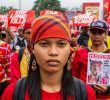
Punk’d. Anderson Alonzo says he saw soldiers electrocuting one of his friends. (davaotoday.com photo by Jeffrey Tupas)
A Davao City resident recalls the arrest and ensuing torture he and 10 other punks suffered in the hands of the police and military in Mountain Province. “We thought we were going to be ‘salvaged�,� Anderson Alonzo recalled. �Everyone was scared. All I could think about was, whatever happens, we wanted our bodies to be taken back home.”
By Grace S. Uddin
davaotoday.com
DAVAO CITY � Anderson Alonzo is a punk. He likes to dress differently, as punks often do. His life revolves around defying the conventions of mainstream society. He is, in other words, a rebel.
When a friend invited the 19-year-old Calinan resident to a punk concert that promised to feature alternative �do-it-yourself� music — the kind that, according to Alonzo, explores themes ranging from environmentalism to existentialism � he was hooked.

Misadventure. Alonzo says it will take a long time for him to go out again to seek another adventure. (davaotoday.com photo by Jeffrey Tupas)
Never mind that the concert would be held in Tarlac, in Luzon, and that he would have to travel for days to make it to the gig. But Alonzo was a punk — and punks are a determined and earnest lot.
On Dec. 6, 2005, he and four friends — including Davao City residents Rundren Berloize Lao, 25, and Jethro Villegas, 22 � hitchhiked to Luzon. There, they were joined by six other friends. They had fun at the concert. The nightmare began soon afterward.
It was Valentine�s Day. They were on their way to Sagada, Mountain Province, when they were arrested by policemen. They were accused of being members of a team of communist New People�s Army guerrillas who, a few weeks earlier, had raided a military outpost in Mankayan town.
The Sagada 11, as the youths came to be known, were arrested without warrant. They were also tortured repeatedly.
They became unlikely poster children of the repression and brutality that was sweeping the countryside. Their experience generated an international outcry and also underscored the fact that, in the Philippines, due process and civil liberties are routinely violated by authorities.










